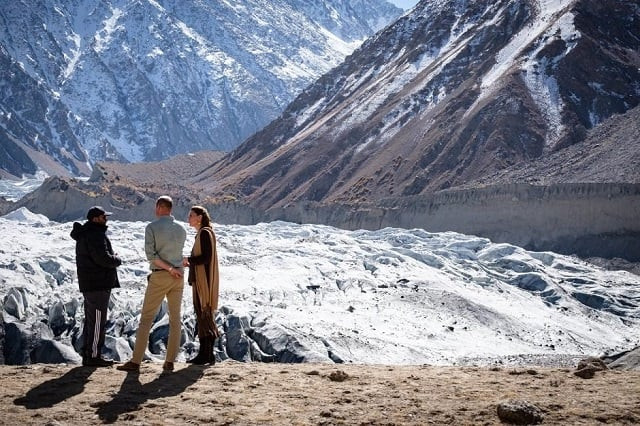Royal spotlight on our glaciers
As global temperature rise affect Pakistan

PHOTO: PID
Prince William had stated in an earlier speech in Islamabad that climate change was one of the major themes of their five-day trip to Pakistan and hoped the trip to Chitral would help the couple better understand the challenges local villagers were facing. Chitral District is on the frontlines of climate change with a series of Glacial Lake Outburst Floods (GLOF) in recent years including this past summer.
The Duke had read the recent groundbreaking study by the International Centre for Integrated Mountain Development (ICIMOD), which shed light on the climate change threats faced by the ranges that make up the Hindu Kush Himalaya (HKH) region. He quoted from the report in his speech: “This [global temperature rise] could lead to a loss of over a third of these vital glaciers in less than a century, with enormous impacts not only on the availability of water, but on agriculture and hydropower generation.”
He said he hoped to learn “what more we all can do to help prevent and mitigate this impending global catastrophe”.
For starters, rich countries like the UK need to cut their carbon emissions drastically — Pakistan is a low emitter, contributing less than one per cent to global emissions. While local diesel fumes and burning of biomass contribute to black carbon which can settle on glaciers and accelerate their warming, the main reason for their melting is the global temperature rise of 1.1 degrees Celsius since the industrial revolution. This was caused by the massive burning of fossil fuels as countries like Britain and the US industrialised, and continues with India and China becoming large emitters.
In fact, the ICIMOD study says that even if we manage to limit further global warming to 1.5 degree Celsius, 36% of the glaciers in the HKH region will be gone by 2100. If emissions are not cut, the loss is even higher — two thirds of the glaciers will be lost forever, destabilising Asia’s rivers, including the Indus.
The report also notes that glaciers in the region have thinned, retreated, and lost mass across the HKH region since 1970s, except for parts of the Karakoram and Pamir. The royal couple walked around the Chiatibo glacier’s northern tip and saw how it has retreated in recent years.
The Green Climate Fund has given Pakistan a grant to help it address the increasing numbers of Glacial Lake Outburst Floods (GLOF). Pakistan’s Ministry of Climate Change and UNDP will be implementing a $37 million project that will be scaling up risk reduction in Northern Pakistan.
Unfortunately, the project which was supposed to start in 2018 was slowed down by procedural and bureaucratic delays for over a year now. The project will set up early warning systems and automated weather stations. It will focus on building small-scale risk reduction infrastructure such as gabion walls and monitor the discharge and movement of glaciers in 16 valleys in G-B and eight in Chitral. However, the vulnerability assessment reports on threatening glaciers are yet to be completed and even the valley selection has not been finalised as yet. Hopefully, this can be done before next summer. Let’s hope Prince William’s visit adds impetus to this project and he comes back to check on Chitral’s vulnerable mountain villagers.
Published in The Express Tribune, October 19th, 2019.
Like Opinion & Editorial on Facebook, follow @ETOpEd on Twitter to receive all updates on all our daily pieces.















COMMENTS
Comments are moderated and generally will be posted if they are on-topic and not abusive.
For more information, please see our Comments FAQ